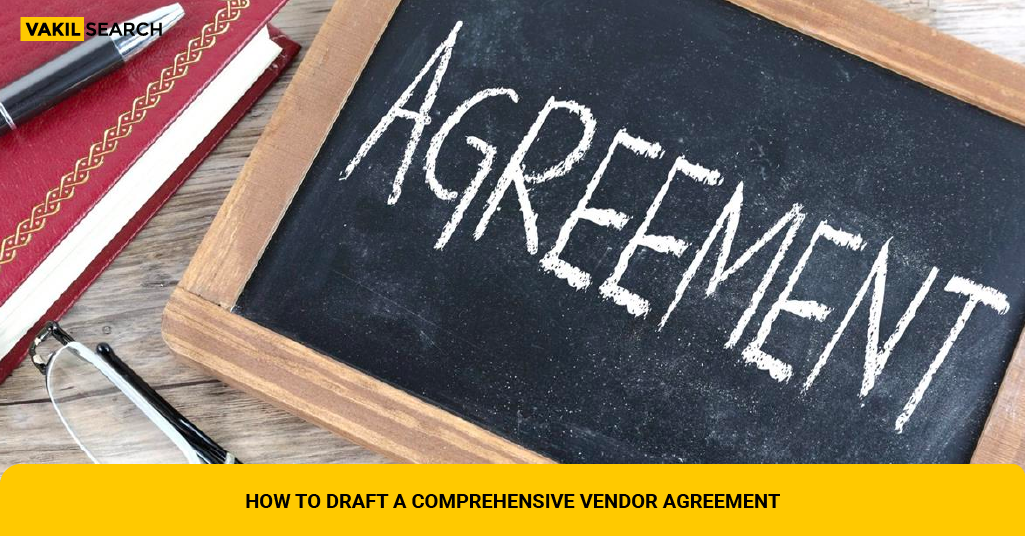A vendor agreement is an essential document for any business that engages third-party vendors to provide goods or services. It outlines the terms and conditions of the vendor’s engagement and ensures that both parties are on the same page. In India, vendor agreements must comply with local laws and regulations. Draft a comprehensive vendor agreement with Vakilsearch experts.
Overview on Vendor Agreements in India
Vendor agreements are contracts between businesses and their third-party vendors that outline the terms and conditions of the vendor’s engagement. They are essential for businesses that rely on vendors to provide goods or services, as they help to ensure that both parties understand their rights and obligations. In India, vendor agreements must comply with local laws and regulations. Lets check how to draft a comprehensive vendor agreement.
Importance of Vendor Agreements in India
Clearly Defines Expectations: A vendor agreement helps to clearly define the expectations of both parties. This includes the goods or services to be provided, timelines, payment terms, and any other relevant details. Having a well-defined agreement ensures that there is no confusion or miscommunication between the parties.
Protects Intellectual Property: If a vendor will be creating or using any intellectual property during their engagement, the vendor agreement should clearly define the ownership and usage rights. This helps to protect the intellectual property rights of the business and the vendor.
Ensures Compliance with Local Laws: Vendor agreements in India must comply with local laws and regulations, including the Indian Contract Act, of 1872, the Sale of Goods Act, 1930, and the Consumer Protection Act, of 2019. Having a well-drafted agreement ensures that the business and the vendor are compliant with local laws.
Mitigates Risks: A vendor agreement includes clauses that protect both parties from any losses or damages resulting from the engagement. This includes indemnification clauses that protect the business from any losses or damages caused by the vendor.
Provides a Basis for Legal Action: In case of any disputes or legal issues, a vendor agreement provides a basis for legal action. It helps to ensure that both parties understand their rights and obligations and provides a framework for resolving any disputes.
Key Components of a Vendor Agreement
A vendor agreement should include the following key components:
Scope of Work: The vendor agreement should clearly define the goods or services that the vendor will provide. This section should include a detailed description of the work to be performed, timelines, and any deliverables.
Payment Terms: The vendor agreement should outline the payment terms, including the amount, frequency, and method of payment. It should also specify any payment milestones or contingencies.
Warranties: The vendor should provide warranties that the goods or services provided will meet certain quality standards. This section should specify the duration and scope of the warranties.
Confidentiality and Non-Disclosure: The vendor agreement should include clauses that protect the confidentiality of any sensitive information that the vendor may access during their engagement.
Termination: The vendor agreement should outline the circumstances under which either party can terminate the engagement, as well as the notice period required.
Intellectual Property: If the vendor will be creating or using any intellectual property during their engagement, this should be clearly defined in the agreement.
Indemnification: The vendor agreement should include clauses that protect both parties from any losses or damages resulting from the engagement.
Considerations for Vendor Agreements in India
When drafting a vendor agreement for a business operating in India, there are several considerations to keep in mind:
Comply with Local Laws and Regulations: Vendor agreements in India must comply with local laws and regulations, including the Indian Contract Act, 1872, the Sale of Goods Act, 1930, and the Consumer Protection Act, 2019.
Use Clear and Concise Language: The agreement should use clear and concise language that is easy for both parties to understand.
Seek Legal Advice: It is advisable to seek the advice of a legal professional when drafting a vendor agreement in India to ensure compliance with local laws and regulations.
Steps After Drafting a Vendor Agreement
Review and Revise: Before finalising the agreement, it is important to review and revise the document to ensure that all the terms and conditions are clear, accurate, and comprehensive. Both parties should review the agreement carefully and make any necessary revisions or changes.
Sign and Execute: Once the agreement has been reviewed and revised, it should be signed and executed by both parties. The signatures should be witnessed or notarised as required by law.
Store the Agreement: It is important to keep a copy of the signed agreement in a safe and secure location. This will ensure that both parties have access to the agreement if any issues arise in the future.
Monitor Performance: Once the agreement is in effect, both parties should monitor performance to ensure that all the terms and conditions are being met. This may involve periodic reviews, status reports, or other forms of communication to ensure that the vendor is delivering the goods or services as promised.
Handle Disputes: In the event of a dispute, the vendor agreement should outline the process for resolving disputes. This may involve mediation, arbitration, or litigation. Both parties should be familiar with the dispute resolution process and should work together to resolve any issues that arise.
Conclusion
A comprehensive vendor agreement is essential for businesses that engage third-party vendors to provide goods or services. When drafting a vendor agreement in India, it is important to include key components such as the scope of work, payment terms, warranties, confidentiality and non-disclosure, termination, intellectual property, and indemnification. It is also important to comply with local laws and regulations, use clear and concise language, and seek legal advice when necessary. By following these guidelines, businesses can ensure that their vendor agreements are comprehensive, effective, and legally compliant.
Also Read:


